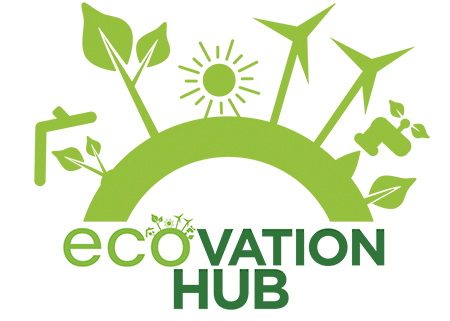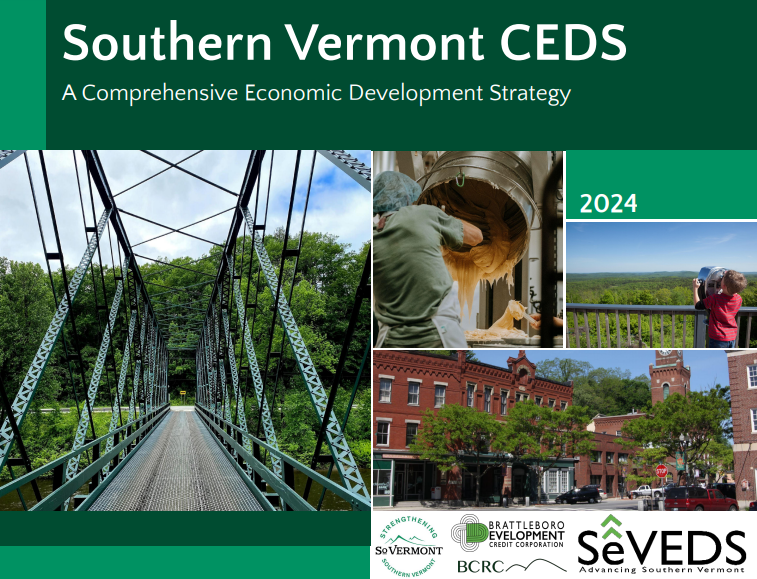
Education Consortium forming to grow Green Economy Workforce opportunities in Tri-State Area north of New England’s Knowledge Corridor
Ecovation Hub continues to develop as strategy to address Vermont Yankee Nuclear Plant closure
![]() Keene, NH, July 20, 2017: A ceremonial MOU signing and networking event by the leadership of Antioch University New England, Greenfield Community College, Keene State College, and the School for International Training will launch the
Keene, NH, July 20, 2017: A ceremonial MOU signing and networking event by the leadership of Antioch University New England, Greenfield Community College, Keene State College, and the School for International Training will launch the  Ecovation Hub Education and Training Consortium, which is dedicated to bringing broader green economy knowledge and opportunities to the tri-state area of Vermont, New Hampshire, and Massachusetts. The signing and networking event with the leaders of the four institutions, will take place from 4 p.m.- 5:30 p.m. on Thursday, July 20th in the Community Room of Antioch University New England, 40 Avon St. Keene, NH 03431. Media are invited to attend to cover the event.
Ecovation Hub Education and Training Consortium, which is dedicated to bringing broader green economy knowledge and opportunities to the tri-state area of Vermont, New Hampshire, and Massachusetts. The signing and networking event with the leaders of the four institutions, will take place from 4 p.m.- 5:30 p.m. on Thursday, July 20th in the Community Room of Antioch University New England, 40 Avon St. Keene, NH 03431. Media are invited to attend to cover the event.
Comments will be provided by Abigail Abrash Walton, PhD, Director of Antioch’s Advocacy for Social Justice & Sustainability concentration and Environmental Studies Master’s program, as well as Co-Director of the University’s Center for ![]() Climate Preparedness and Community Resilience, and Alex Wilson, Founder of BuildingGreen and the Resilient Design Institute will offer comments. Signers at the event are educational institution leaders Dr. Melinda Treadwell, CEO and Provost of Antioch University New England; Dr. Bob Pura, President of Greenfield Community College; Dr. Todd Leach, Chancellor of the University System of New Hampshire, on behalf of Keene State CollegeKeene State College, and Ken Williams, Dean of the School for International Training Graduate Institute.
Climate Preparedness and Community Resilience, and Alex Wilson, Founder of BuildingGreen and the Resilient Design Institute will offer comments. Signers at the event are educational institution leaders Dr. Melinda Treadwell, CEO and Provost of Antioch University New England; Dr. Bob Pura, President of Greenfield Community College; Dr. Todd Leach, Chancellor of the University System of New Hampshire, on behalf of Keene State CollegeKeene State College, and Ken Williams, Dean of the School for International Training Graduate Institute.
The Consortium brings together these four higher education institutions in the tri-state region and connects planned education and training programs with workforce development priorities and green economy opportunities.
About the Consortium:
The Ecovation Education and Training Consortium has been designated a vital project through the 2016 Windham Region S.M.A.R.T. CEDS ranking process. This tri-state green economy regional development initiative, includes four components:
• Education and Training Consortium will coordinate learning and credentialing for green building; products and service; finance, insurance and real estate; sustainable agriculture and agroforestry; and building climate resilient communities.
• The Living Laboratory will create a destination experience for visitors to the region by mapping the region’s vibrant network of resilient, sustainable, climate prepared communities, businesses, and organizations.
• The Systems Integration and Applied Research Center will support the development of Ecovation Hub platforms through R & D.
• Antioch University New England’s Center for Climate Preparedness and Community Resilience, which delivers a range of capacity-building education and training programs and conducts applied research.
About the signers:
- Antioch University New England
Founded in 1964, Antioch University New England (AUNE) provides learner-centered education to empower students with the knowledge and skills to lead meaningful lives and to advance social, economic, and environmental justice. Coursework in all of its Master’s degrees, Doctoral degrees, and certificates integrates practice with theory in an environment that fosters scholarship and activism. AUNE is part of Antioch University, an accredited, non-profit university and a bold and enduring source of innovation in higher education that serves adult students around the world, online, and from its five campuses in four states. For more information, visit: www.antioch.edu/new-england
- School for International Training
School for International Training (SIT) is a global institution offering programs at the graduate and undergraduate levels for an increasingly internationalized society. SIT delivers an education that challenge our students to think critically and provides them with real skills to tackle the most critical contemporary global issues. Our values – our commitment to inclusion, experiential education, engaged learning, community, reciprocity, social justice, and sustainability – foster the development of emerging leaders, deeply concerned with and committed to issues central to social justice, long-term peace, and understanding across cultures worldwide. https://www.sit.edu/about/
- Greenfield Community College
Lives change for the better every day at Greenfield Community College. Founded in 1962, GCC is located in the Pioneer Valley of Western Massachusetts and is the smallest of the 15 community colleges in the Massachusetts public higher education system. Accredited by the New England Association of Schools and Colleges, GCC offers: Associate degrees and career certificates in highly sought-after fields to prepare students for the region’s growing knowledge-based economy; a wide variety of innovative programs with varied learning environments; and, customized workforce development training catered to specific industry needs and interests. GCC has transfer agreements with public and private schools throughout New England and nearly fifty percent of GCC students transfer to four-year colleges and universities. To learn more, visit www.gcc.mass.edu.
- Keene State College
Keene State College is a preeminent public liberal arts college that ensures student access to world-class academic programs. Integrating academics with real-world application and active community and civic engagement, Keene State College prepares graduates to meet society’s challenges by thinking critically, acting creatively, and serving the greater good. To learn more about Keene State College, visit www.keene.edu. Wisdom to Make a Difference.
About the Ecovation Hub:
The creation of the Ecovation Hub is an outgrowth of a key cluster analysis project identified in the Windham Region CEDS . This project was initially funded by the U.S. Department of Commerce EDA and the State of Vermont Windham County Economic Development Program.
Windham Region CEDS . This project was initially funded by the U.S. Department of Commerce EDA and the State of Vermont Windham County Economic Development Program.
The emerging national hub of sustainability and resilience is envisioned to act as an incubator, accelerator and engine of economic growth for the tri-state region of Southern Vermont, Southwestern New Hampshire and North-West Massachusetts. Its focus is sustainable economic growth and community-scale resilience to climate change.
Since 2007, the Brattleboro Development Credit Corporation (BDCC) and Southeastern Vermont Economic Development Strategy (SeVEDS) have led an investigative assessment of existing assets that could fuel economic development in the wake of the power plant closure.
This team identified a unique cluster of green building assets across the tri-state region of Windham and Bennington Counties in Vermont, Cheshire County in New Hampshire, and Franklin County in Massachusetts that includes recognized national leaders in research, product development, manufacturing, and design and construction of high-performance buildings and communities. With an initial investment of over half a million dollars in federal, state and private investment, continued development of the “Ecovation Hub” is being driven by a tri-state Leadership Team chaired by Alex Wilson, founder of Building Green and The Resilient Design Institute in Brattleboro, Vermont. The continued development and uniting of these assets to build a hub of sustainability and resilience will serve as a model for other rural communities nationally and internationally.
The effort has already successfully engaged industry leaders, including:
• Antioch University: The home of the Center for Climate Preparedness and Community Resilience.
• Bensonwood: A national leader in sustainable, high performance timber framing construction.
• The Resilient Design Institute: A national nonprofit dedicated to advancing the practice of resilient design for buildings and communities.
• World Learning: An international development educational organization with programs in 60 different countries.
With the participation of these organizations as well as institutions with financial and international connections, the Ecovation Hub Initiative is developing an integrated approach to spurring growth of green economy industries, rather than focusing on a single segment.
About Leadership Team:
• Alex Wilson, Resilient Design Institute, Brattleboro, VT
• Abigail Abrash Walton, PhD, Antioch University, Keene, NH
• Dan Yates, President, Brattleboro Savings & Loan, VT
• Jennifer Stromsten, Brattleboro Development Credit Corporation, VT
• Jim Verzino, Strolling of the Heifers, Brattleboro, VT
• Sarah Kanabay, Franklin Community Co-operative, Greenfield, MA
• Phil Suter, Executive Director Keene Chamber of Commerce, NH
• Andrew Baker, Franklin Hampshire Regional Employment Board, MA
• Stephan Dotson, Brattleboro, VT
About BDDC & SeVEDS:
 The Brattleboro Development Credit Corporation is a private, nonprofit economic development organization that serves as a catalyst for industrial and commercial growth throughout Southeastern Vermont, including Windham County and the towns of Readsboro, Searsburg, and Weston. BDCC serves as the State of Vermont’s certified Regional Development Corporation (RDC) for the greater Windham County area. BDCC is one of 12 RDCs throughout Vermont. For more information visit: https://brattleborodevelopment.com/
The Brattleboro Development Credit Corporation is a private, nonprofit economic development organization that serves as a catalyst for industrial and commercial growth throughout Southeastern Vermont, including Windham County and the towns of Readsboro, Searsburg, and Weston. BDCC serves as the State of Vermont’s certified Regional Development Corporation (RDC) for the greater Windham County area. BDCC is one of 12 RDCs throughout Vermont. For more information visit: https://brattleborodevelopment.com/
Southeastern Vermont Economic Development Strategies (SeVEDS) is an affiliate of BDCC that grew from a 2008 grassroots effort, initiated by BDCC, to reverse the economic decline of the Windham Region and plan for the economic impacts from the closure of the Vermont Yankee nuclear power plant. In 2014, after multiple years of regional input, education and data gathering, SeVEDS submitted the Windham Region’s federally recognized S.M.A.R.T. Comprehensive Economic Development Strategy for federal approval. For more information visit: www.seveds.com
Press Contacts:
- Jennifer Stromsten, Brattleboro Development Credit Corporation, VT: (802) 257-7731, ext. 230
- Alex Wilson, Resilient Design Institute, Brattleboro, VT: alex@resilientdesign.org
- Melinda Garland, Antioch University, Keene, NH: mgarland@antioch.edu
- Kelly Ricaurte, Keene State College: kricaurte@keene.edu
- Kate Casa, School for International Training: kate.casa@sit.edu


